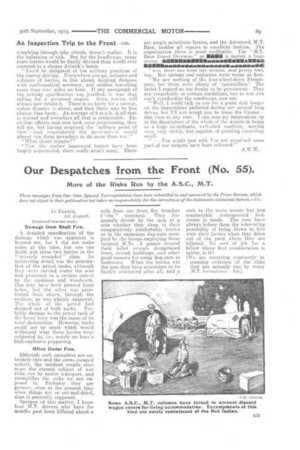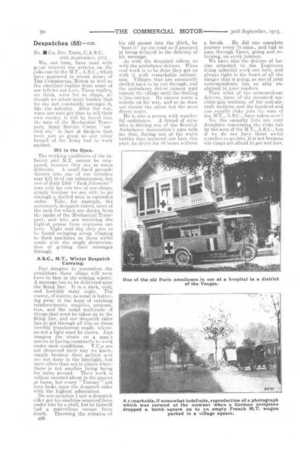Our Despatches from the Front (No. 55).
Page 9

Page 10

If you've noticed an error in this article please click here to report it so we can fix it.
More of the Risks Run by the A.S.C., M.T.
These messages from Our Own Special Correspondents have been submitted to and censored by the Press Bureau, which does not object to their publication but takes no responsibility for the correctness of the statements contained therein.—ED.
lx FRANCE, lit August.
(Continued from la.st
Damage from Shell Fire.
A detailed specification of the damage which was apparent is beyond me, for I did not make notes at the time, but one can fairly put these two lorries in the " severely wounded" class. An interesting detail was the penetration of the petrol tanks, although they were carried under the seat arid protected to a certain extent by the cushions and woodwork. One may have been pierced from below, but the other was penetrated from above, through the cushion, as was plainly apparent. The whole of the petrol had drained out of both tanks. Probably damage to the petrol tank of the burnt lorry was the. cause of its total destruction. However, tanks could not he made which would withstand what these lorries were subjected to, i.e., nearly an hour's high-explosive peppering.
Often Under Fire.
Although such casualties are extremely rare and the crews escaped unhurt, the incident recalls once more the eternal subject of war risks run by motor transport, and exemplifies the risks we are exposed to. Probably they are greater, even at the present time when things are so cut-and-dried, than is generally supposed.
Apropos of this matter, I know four M.T. drivers who have for months past been billeted about a
mile from our front fire trenches
(" the " trenches). They frequently decide by the spin of a coin whether they sleep in their comparatively comfortable lorries or in the capacious dug-outs occupied by the troops employing these isolated M.Ts. A glance around their billet reveals decapitated trees, ruined buildings, and other good reasons for using dug-outs as bedrooms. When the lorries win the toss they have sometimes to be hastily evacuated after all, and ,a rush to the more secure but less comfortable -• underground bedrooms is made. • The men have always 'before' them the interesting posibility of being' blown to bits with .their lorries when they drive out of the yard where they': are billeted. No sort of job.for a fellow' whose first 'consideration is safety, is it?
[We are receiving constantly in_ creasing evidence of the risks that are • actually -run by many M.T. formatirms. •• En.] No, II Co. Div. Train, C.A.S.C. •
20th September, 1915. We, out here, have read with groat. interest the articles on the risks run by the NET., A.S.C., which. have appeared in recent issues of THE COMMERCIAL MOTOR as well as the excellent replies from some of our fellows out here. These replies, we think, were for us chaps, although we admit quite frankly that we are not constantly amongst it, like the infantry. After the war, when our men get time to tell their own stories., it will be found that the men of the Mechanical Transport, Army Service Corps, " carried on," in face of dangers that were just as great as any other branch of the Army had to work against.
Hit in the Open.
The working conditions of the infantry and M.T. cannot be compared, because they are so much different. A small hand grenade thrown into one of our trenches may kill 10 of our infantrymen, but one of their £550 " Jack J ohn sons " may only lay out two of our chaps, simply because we are able to go through a shelled area in extended order. Take, for example, the motorcycle despatch riders, most of the men for which are drawn from the ranks of the Mechanical Transport, and who are receiving the highest praise from everyone out here. Night and day they are to he found swinging along, clinging to their machines on those awful roads with the single determination of getting their messages through.
A.S.C., M.T., Winter Despatch Carrying.
Just imagine to yourselves the conditions those chaps will soon have to face in the coming winter. A message has to be delivered near the firing line. It is a dark, cold, and horribly rainy night. The enemy, of course, as usual is battering away in the hope of catching reinforcements, supplies, ammunition, and the usual multitude ef things that must be taken up to the firing line, and our despatch rider has to get through all this on those terribly treacherous roads, whereon not a light must be shown. Just imagine the strain on a man's nerves in having constantly to work under such conditions. V.C.s are not showered their way we know, simply because their gallant acts are not done in the limelight, but more often than not in places where thereis not another living being for miles around. • Their work is seldom shouted about in the papers at home, but every " Tommy " out here looks upon the desp.atc'h rider with the highest admiration. On one occasion I saw a despatch rider get his machine smashed from under him by a shell, but he himself had a marvellous escape from death. Throwing the remains of
i336 his old mount into the ditch, he "beat it" up the road as if annoyed at being delayed in the delivery of his message.. As with the despatch riders, so with the ambulance drivers. When real work is to be done they get on with it with remarkable enthusiasm. Villages that are constantly shelled have to be run through, and the ambulance driver cannot wait outside the village until the shelling is less intense. He cannot waste a minute on his way, and so he does not, choose the safest but the most direct route.
He is also a person with wonderful endurance. A friend of mine who is driving one of the Scottish Ambulance Association's cars tells me that, during one of the worst battles that occurred out here this year, he drove for 18 hours without
a break. He did one complete journey every 75 mins., and had to paes. through Ypres, giong and returning, on every journey.
We have also the drivers of lorries attached to the Engineers doing splendid work out here, and always right in the heart of all the danger that is piing, as one of your correspondents has so ably explained to your readers. Then what of the armoured-car drivers, those of the mounted machine-gun sections, of the anti-aircraft sections, and the hundred and one equally risky jobs the men of the M.T., A.S.C., have taken over '? No, the casualty lists are very deceptive concerning the risks run by the men of the 111.T., A.S.C., but if we do not have those awful trenches to go into, it is riot because our chaps are afraid to get wet feet.






















